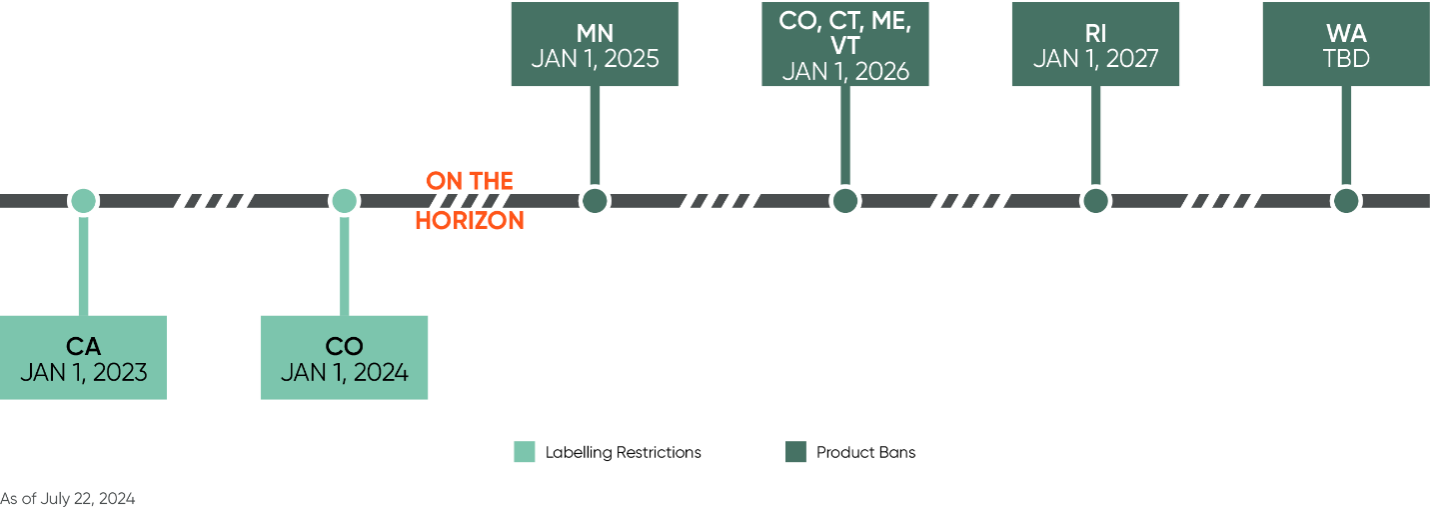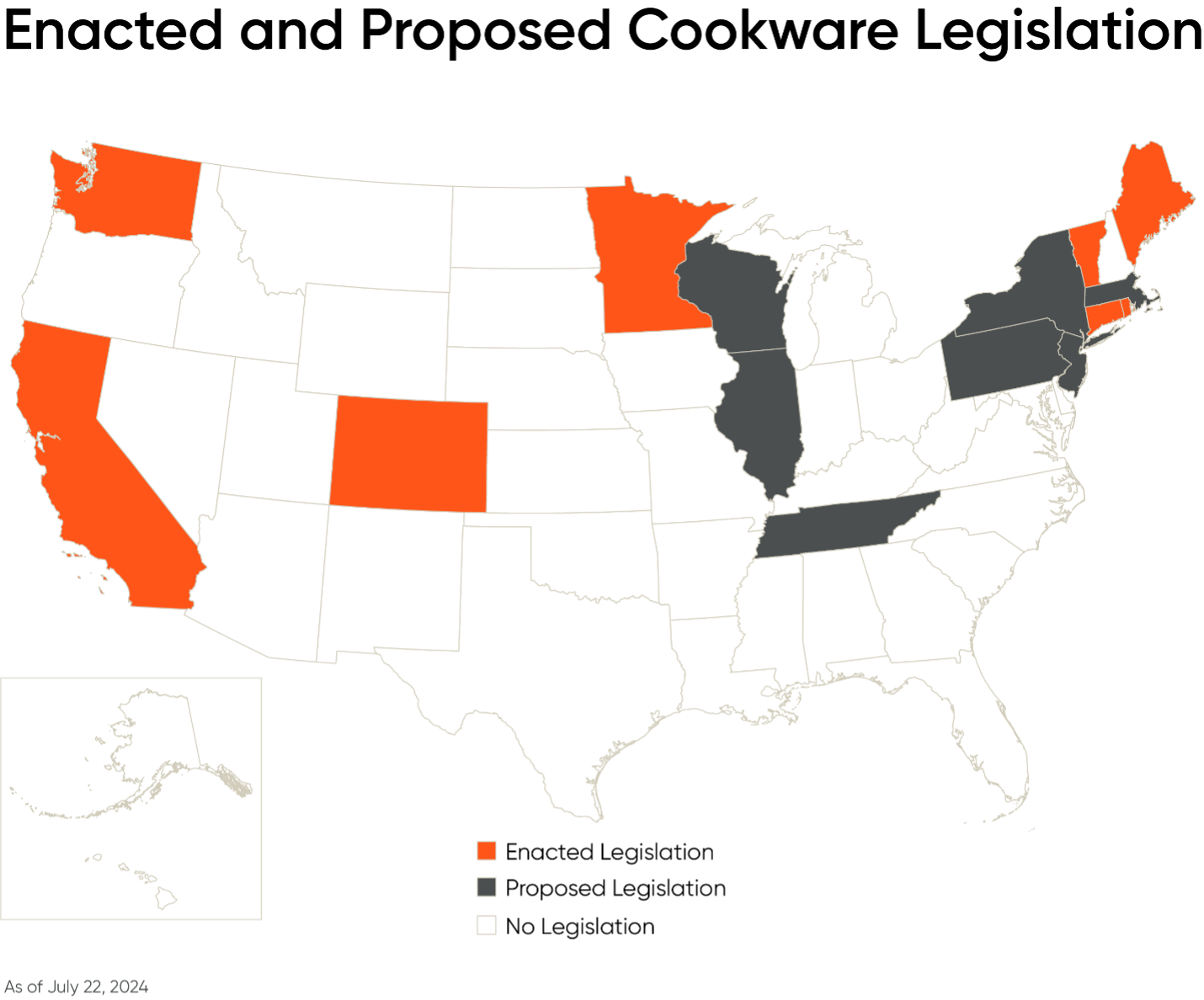Insights
PFAS in Cookware: State-by-State Regulations
Aug 07, 2024Summary
In the absence of comprehensive federal regulation of PFAS in cookware, states are enacting and proposing their own laws. Thus far, eight (8) states have enacted laws addressing PFAS substances in cookware and bakeware (“Cookware”), and seven (7) states introduced bills that are currently pending.
State Cookware Laws
As indicated below, the original PFAS cookware laws addressed labelling requirements, and the notification was usually required to appear on the product label as well as the product’s website. Recently, several states have enacted outright bans of intentionally added PFAS in all cookware products. This evolution of these laws underscores how PFAS are being more aggressively regulated in the cookware industry.
Some states have also expanded the definitions in the laws, including the definition of “intentionally added.” In some states the definition now includes both chemicals that have been deliberately added to perform some function in the finished product, and chemicals used as part of the manufacturing process.
One of the most challenging aspects of the cookware laws was that the definition of “cookware” appears to apply to the entire cookware product, not just the food or beverage contact surface. Minnesota – the state with the first compliance deadline – recently addressed this issue and clarified that “cookware” would only be regulated if the product had a non-stick food contact surface which contains intentionally added PFAS:
"For the purposes of the 2025 PFAS prohibitions, the MPCA interprets cookware to include only items that have a food contact surface that has a nonstick PFAS coating. If an item does not have a nonstick PFAS coating on a food contact surface, it is not included in the cookware category. If an item is not included in the cookware category, the additional components are not required to be PFAS free to meet the 1/1/25 regulation, but will be required to be PFAS free to meet the 1/1/32 regulation."
This clarification has important implications for the industry, and is something that may be replicated in the other states which have similar definitions of “cookware.”
With respect to enacted laws, states have established different deadlines. Some have already become effective, and others will go into effect in the future.

- California - Jan 1, 2023 (labelling restrictions)
- Colorado - Jan 1, 2024 (labelling restrictions)
- Minnesota - Jan 1, 2025 (product bans)
- Colorado, Connecticut, Maine, Vermont. -Jan 1, 2026 (product bans)
- Rhode Island - Jan 1, 2027
- Washington - TBA
This map and the following information below provide a more detailed analysis of each state’s regulatory approach and is current as of July 22, 2024. This area of law is changing, especially as demonstrated by the number of bills that are currently being proposed.

Enacted Legislation |
Effective date
January 1, 2023
Cookware description
Effective currently, a manufacturer of cookware sold that contains intentionally added chemicals present in the handle of the product or in any cookware surface that comes into contact with food, foodstuffs, or beverages shall post information on the internet website.
Effective currently, a manufacturer of cookware that contains intentionally added chemicals present in the handle of the product or in any product surface that comes into contact with food, foodstuffs, or beverages shall list the presence of those chemicals on the product label.
Effective currently, a manufacturer shall not make a claim that the cookware is free of any specific chemical if the product contains PFAS substances.
“Cookware” means durable houseware items that are used in homes and restaurants to prepare, dispense, or store food, foodstuffs, or beverages. Cookware includes pots, pans, skillets, grills, baking sheets, baking molds, trays, bowls, and cooking utensils.
“Intentionally added chemical” means a chemical that a manufacturer has intentionally added to a product and that has a functional or technical effect in the product, including the components and breakdown products of intentionally added chemicals.
Regulatory status
Enacted
Details
Effective date
January 1, 2024
Cookware description
Effective currently, a manufacturer of cookware that contains an intentionally added PFAS substance in the handle of the product or in any product surface that comes into contact with food, foodstuffs, or beverages shall add information to the product label and the website.
Effective currently, a manufacturer shall not make a claim, on the cookware package, that the cookware is free of any PFAS substances unless no individual PFAS substance is intentionally added to the cookware.
"Cookware" means a durable houseware product that is used in residences or kitchens to prepare, dispense, or store food or beverages. Cookware includes pots, pans, skillets, grills, baking sheets, baking molds, trays, bowls, and cooking utensils.
"Intentionally added PFAS chemicals" means PFAS chemicals that a manufacturer has intentionally added to a product and that have a functional or technical effect on the product and includes those that are intentional breakdown products of an added chemical.
Regulatory status
Enacted
Details
BCLP blog, "Colorado increases restrictions on PFAS in consumer products"
Effective date
January 1, 2026
Cookware description
Beginning on January 1, 2026, a person shall not sell or distribute certain products that contain intentionally added PFAS substances, including cookware.
"Cookware" does not include food equipment intended primarily for use in commercial settings, including food equipment sold to a business that has a retail food establishment license.
Regulatory status
Enacted
Details
BCLP blog, "Colorado increases restrictions on PFAS in consumer products"
Effective date
January 1, 2026
Cookware description
Beginning on January 1, 2026, no person shall sell or distribute certain products that contain intentionally added PFAS, including cookware.
“Cookware" means durable houseware items used to prepare, dispense, or store food, foodstuffs, or beverages, including, but not limited to, pots, pans, skillets, grills, baking sheets, baking molds, trays, bowls, and cooking utensils.
"Intentionally added" means PFAS deliberately added during the manufacture of a product where the continued presence of PFAS is desired in the final product or one of the product's components to perform a specific function.
Regulatory status
Enacted
Details
Effective date
January 1, 2026, and January 1, 2032
Cookware description
Beginning on January 1, 2026, a person may not sell or distribute a cookware product containing intentionally added PFAS.
"Cookware product" means a durable houseware product intended to be used to prepare, dispense, or store food, foodstuffs, or beverages, including, but not limited to, pots, pans, skillets, grills, baking sheets, baking molds, trays, bowls, and cooking utensils.
"Intentionally added PFAS" means PFAS added to a product or one of its product components to provide a specific characteristic, appearance, or quality or to perform a specific function, including any degradation byproducts of PFAS
Beginning on January 1, 2032, a person may not sell or distribute any product that contains intentionally added PFAS, unless the Maine Department of the Environment (“MDEP”) has determined that the use is a currently unavoidable use, subject to some exceptions.
Regulatory status
Enacted
Details
MDEP Currently Unavoidable Use Information
MDEP PFAS in Products Information
BCLP blog, "Maine significantly amends its PFAS consumer products law"
Effective date
January 1, 2025, and January 1, 2032
Cookware description
Beginning on January 1, 2025, a person may not sell or distribute certain products if the product contains intentionally added PFAS, including cookware.
"Cookware" means durable houseware items used to prepare, dispense, or store food, foodstuffs, or beverages. Cookware includes, but is not limited to, pots, pans, skillets, grills, baking sheets, baking molds, trays, bowls, and cooking utensils.
"Intentionally added" means PFAS deliberately added during the manufacture of a product where the continued presence of PFAS is desired in the final product or one of the product's components to perform a specific function.
Beginning on January 1, 2032, a person may not sell or distribute any product that contains intentionally added PFAS, unless the Minnesota Pollution Control Agency (“MPCA”) has determined that the use of PFAS in the product is a currently unavoidable use.
Regulatory status
Enacted
Details
Effective date
January 1, 2027
Cookware description
Beginning on January 1, 2027, no person shall manufacture or sell certain products that contain intentionally added PFAS substances, including cookware.
"Cookware" means durable cookware items that are used in homes and restaurants to prepare, dispense, or store food, foodstuffs, or beverages. Cookware includes pots, pans, skillets, grills, baking sheets, baking molds, trays, bowls, and cooking utensils.
“Intentionally added PFAS" means PFAS added to a product to provide a specific characteristic, appearance, or quality to perform a specific function. It also includes any degradation byproducts of PFAS that are intentional breakdown products of an added chemical.
Regulatory status
Enacted
Details
Effective date
January 1, 2026
Cookware description
Beginning on January 1, 2026, a manufacturer shall not manufacture, sell, or distribute cookware to which PFAS have been intentionally added in any amount.
“Cookware” means durable houseware items used to prepare, dispense, or store food, foodstuffs, or beverages and that are intended for direct food contact. Cookware includes pots, pans, skillets, grills, baking sheets, baking molds, trays, bowls, and cooking utensils.
“Intentionally added” means the addition of a chemical in a product that serves an intended function in the product component.
Regulatory status
Enacted
Details
Effective date
TBD
Cookware description
Washington Department of Ecology (“DOE”) may consider any product identified in the Washington DOE’s Chemical Action Plan to be a “priority consumer product” that uses PFAS substances.
Note: To date, cookware has been identified as a “priority consumer product” in a draft document, but so far DOE has not taken any further action to regulate PFAS in cookware.
Regulatory status
Enacted
Details
Washington DOE Draft Chemical Action Plan
Proposed Legislation |
Effective date
January 1, 2025
Cookware description
Beginning on January 1, 2025, a person may not sell or distribute certain products that contain intentionally added PFAS, including cookware.
“Cookware" means durable houseware items used to prepare, dispense, or store food, foodstuffs, or beverages, including but not limited to, pots, pans, skillets, grills, baking sheets, baking molds, trays, bowls and cooking utensils.
"Intentionally added" means PFAS deliberately added during the manufacture of a product or reasonably anticipated to be present.
Regulatory status
Proposed
Details
Effective date
January 1, 2026
Cookware description
Beginning on January 1, 2026, no manufacturer, distributor, wholesaler, or retailer shall sell or distribute certain products to which PFAS substances have been intentionally added, including cookware.
A manufacturer of certain products that are sold, distributed, or offered for promotional purposes in (or imported into) the state shall test for the presence of unintentionally added PFAS, including cookware.
“Cookware” means durable houseware items that are used in homes and restaurants to prepare, dispense, or store food, foodstuffs, or beverages, including, but not limited to, pots, pans, skillets, grills, baking sheets, baking molds, trays, bowls and cooking utensils.
“Intentionally added” means the addition of a chemical to a final product or product component for the purpose of providing a specific characteristic, appearance, or quality or to perform a specific function in the product or product component, including PFAS substances that are intentional chemical breakdown products or derivatives of an added chemical.
Regulatory status
Proposed
Details
Effective date
Two years after the effective date of the legislation.
Cookware description
Beginning two years after the effective date, a manufacturer of cookware that contains intentionally added PFAS in the handle of the product or in any product surface that comes into contact with food, foodstuffs, or beverages, shall list the presence of PFAS on the product label and declare information on the website.
“Cookware” means durable houseware items that are used in homes and restaurants to prepare, dispense, or store food, foodstuffs, or beverages. Cookware includes, but is not limited to, pots, pans, skillets, grills, baking sheets, baking molds, trays, bowls, and cooking utensils.
“Intentionally added PFAS” means PFAS added to a product or intentionally used during the development of a product or one of its product components to provide a specific characteristic, appearance, or quality or to perform a specific function. Intentionally added PFAS also includes any degradation byproducts of PFAS.
Regulatory status
Proposed
Details
Effective date
January 1, 2026
Cookware description
Beginning on January 1, 2026, no person shall distribute or sell certain products that contain regulated PFAS substances, including cookware.
"Cookware" means durable items that are used in homes, restaurants, institutional, and commercial kitchens to prepare, dispense, or store food, foodstuffs, or beverages for indoor or outdoor use. Cookware includes, but is not limited to, pots, pans, skillets, grills, baking sheets, baking molds, trays, bowls, camping gear, and cooking utensils.
"Regulated PFAS Substances" means PFAS that are:
- an intentionally added chemical that is a chemical in a product that serves an intended function in the product component; or
- present in a product or product component at or above the practical quantitation limit, as measured in total organic fluorine.
Regulatory status
Proposed Law I
Details
Effective date
January 1, 2027
Cookware description
Beginning on January 1, 2027, a person shall not distribute or sell a certain product that contains PFAS substances with intentionally added chemicals, such as cookware, unless the New York State Department of Environmental Conservation has determined that the use of PFAS in such product is currently an unavoidable use.
"Cookware" means a durable houseware item that is used in homes and restaurants to prepare, dispense, or store food, foodstuffs, or beverages. Cookware includes, but is not limited to, pots, pans, skillets, grills, baking sheets, baking molds, trays, bowls, and cooking utensils.
“Intentionally added chemical” is a chemical in a product that serves an intended function in the product component.
Regulatory status
Proposed Law II
Details
Effective date
January 1, 2027
Cookware description
Beginning on January 1, 2027, a person may not manufacture or sell certain products that contain intentionally added PFAS chemical, including cookware.
“Cookware” means durable cookware items that are used in a home or restaurant to prepare, dispense, or store food, foodstuffs, or a beverage. Cookware includes pots, pans, skillets, grills, baking sheets, baking molds, trays, bowls, or cooking utensils.
"Intentionally added PFAS chemical” means:
- A PFAS chemical that is added to a product, or a component of a product, and has a functional or technical effect on the product, including the components of a PFAS chemical and a PFAS chemical that is the intentional product of an added chemical.
- A PFAS chemical that is used or produced during the manufacture or processing of a product and introduced into or onto the product, including any source of a PFAS chemical that is reasonably known to be present, including the use of a processing agent, a mold release agent or fluorination.
Regulatory status
Proposed
Details
Effective date
January 1, 2027
Cookware description
Beginning on January 1, 2025, a person shall not manufacture, sell, distribute, or offer for use a product that contains intentionally added PFAS substances, including cookware.
"Intentionally added" means PFAS substances deliberately added during the manufacture of a product where the continued presence of PFAS substances is desired in the final package or packaging component to perform a specific function.
Regulatory status
Proposed
Details
Effective date
January 1, 2027
Cookware description
Beginning on January 1, 2028, no person may distribute or sell a certain product if the product contains intentionally added PFAS substances, including cookware.
Beginning on January 1, 2034, no person may distribute or sell any product that contains intentionally added PFAS, unless the Wisconsin Department of Natural Resources has determined that the use of the PFAS substance in the product is an unavoidable use.
“Intentionally added PFAS" means PFAS substances that are deliberately added during the manufacture of a product where the continued presence of PFAS is desired in the final product or one of the product's components to perform a specific function.
“Unavoidable use” means a use of a PFAS substance that is protective or beneficial to public health or safety or to the environment and for which there are no feasible alternatives available with a lower risk to public health and the environment.
Regulatory status
Proposed
Details
Conclusion
Several states have started or are currently in the process of enacting laws prohibiting intentionally added PFAS in cookware. These laws present significant challenges to the regulated industry, and have already been the subject of clarification at the agency level, which is a trend that is expected to continue. BCLP is monitoring any actions that state legislatures are enacting or proposing with respect to PFAS and cookware.
If you have a question about how to identify, manage or address PFAS risk in cookware, please visit BCLP’s PFAS webpage or contact Tom Lee, Bryan Keyt, Merrit Jones, John Kindschuh, or any other member of our PFAS team.





